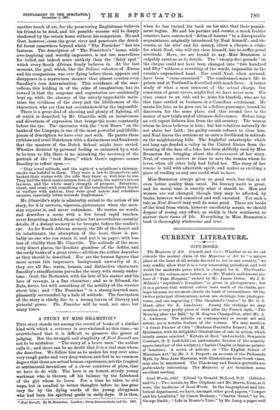A STORY BY MISS BRAMSTON.*
Tuis story stands out among the crowd of books of a similar kind with which a reviewer is overwhelmed at this time,—so overwhelmed that it is difficult to preserve the power of judging. But the strength and simplicity of Neal Russell are not to be mistaken. "The story of a brave man," the author calls it ; and there can be no doubt that it is a real man whom she describes. We follow him as he makes his way over some very rough paths and very deep waters, and feel in no common degree that these are actual human experiences, not the tragical or sentimental inventions of a clever contriver of plots, that we have to do with. The hero is an honest, sturdy young workman who is thrown off his balance by the falsehood of the girl whom he loves. For a time he takes to evil ways, but is recalled to better thoughts before he has gone very far by the dying words of the young clergyman who had been his spiritual guide in early days. It is then,
* Neal Russell. By M. Bramston. London : Swan Sonnenschein and Co. 189L
when he has turned his back on his sins, that their punish- ment begins. He and his partner and cousin, a much feebler creature, have contracted " debts of honour " to a disreputable acquaintance, originally introduced by Neal himself ; and the cousin, at his wits' end for money, alters a cheque, a crime for which Neal, who will not clear himself, has to suffer penal servitude. Here, we are bound to say, Miss Bramston is culpably careless as to details. The " twenty-five pounds " on the cheque could not have been changed into "two hundred and fifty" without a rewriting of the words, impossible to the cousin's unpractised hand. Nor could Neal, when accused, have been "cross-examined." The condemned man's life in prison and at Portland is described with much force. A better study of what a man innocent of the actual charge, but conscious of great errors, might feel, we have never seen. His time comes to an end, and he joins his kinsfolk, who are by this time settled in business in a Canadian settlement. He meets his fate, as he goes out, in a fellow-passenger, bound, he discovers, for the same place, and this second love is the source of new trials and of ultimate deliverance. Before long, an evil report follows him from the old country. The woman whom he loves believes in him ; but her relatives naturally do not share her faith ; the guilty cousin refuses to clear him, and Neal leaves the settlement to earn a livelihood in solitude on the neighbouring hills. The frightful catastrophe which not long ago flooded a valley in the United States from the bursting of the dam of a lake, has been skilfully used by Miss Bramston for bringing about the denouement of her story. Neal, of course, arrives in time to save the woman whom he loves, when all other help had failed her. The story of her rescue is told with admirable spirit, and makes as exciting a piece of reading as any one could wish to have.
Miss Bramston always gives us good work, but this is of even better quality than usual. Its literary merit is great, and its moral tone is exactly what it should be. Men and women are not changed, though they may be affected, by books, however well conceived and well executed. Yet such a tale as Neal Russell may well do some good. There are books of the kind from which, however excellently meant, we should despair of seeing any effect, so sickly is their sentiment, so narrow their views of life. Everyfhing in Miss Bramston's book is thoroughly wholesome and true.


















































 Previous page
Previous page